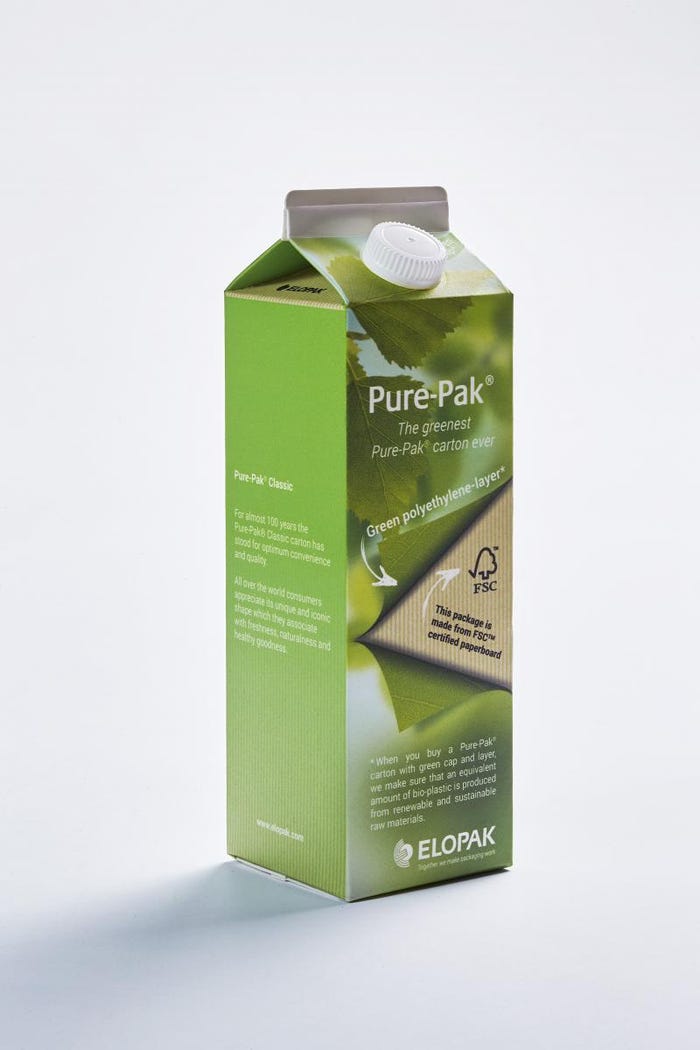In the world of beverage cartons, two of the major players hail from Scandinavia: the first, Tetra Pak, is Swedish; the second is the Norwegian company Elopak. The companies, who engage in a perpetual game of anything-you-do-I-can-do-better, have both put great effort into the development of "green" packaging, introducing redesigned cartons that combine convenience with an improved environmental profile.
December 15, 2014
In the world of beverage cartons, two of the major players hail from Scandinavia: the first, Tetra Pak, is Swedish; the second is the Norwegian company Elopak. The companies, who engage in a perpetual game of anything-you-do-I-can-do-better, have both put great effort into the development of "green" packaging, introducing redesigned cartons that combine convenience with an improved environmental profile. That round looked to have been won this year by Tetra Pak: in what it called an industry first, Tetra Pak announced in April that all of the packages it produced in Brazil would from that time on make use of biobased low-density polyethylene (LDPE). In October, the company said it would be making the industry's first carton made entirely from plant-based, renewable packaging materials commercially available in early 2015, and in November, that company collected two awards at the World Beverage Innovation Awards ceremony in Nuremberg, Germany for "environmental innovation."
 Elopak, however, now claims to have gone one better. The company said that a wide range of Elopak cartons featuring certified renewable polyethylene (PE) will be made commercially available in the coming months, making Elopak the first company to offer beverage cartons with renewable coating to the European market. And in another industry first, Elopak is using second generation renewable PE, made of European-sourced biomass not in competition with food supply.
Elopak, however, now claims to have gone one better. The company said that a wide range of Elopak cartons featuring certified renewable polyethylene (PE) will be made commercially available in the coming months, making Elopak the first company to offer beverage cartons with renewable coating to the European market. And in another industry first, Elopak is using second generation renewable PE, made of European-sourced biomass not in competition with food supply.
Elopak aims to replace all fossil-based raw materials with renewable alternatives as part of its ambitious future proofed packaging strategy. The company is working in partnership with key customers seeking to boost the environmental merits of their packaging.
"The beverage carton is the environmentally superior packaging choice, consisting of at least 75% renewable paperboard derived from responsibly managed forests. The remaining materials are mostly made of polyethylene, a polymer usually produced from fossil-based raw materials," said Kristian Hall, director of corporate environment at Elopak. "Renewable PE brings us much closer to our vision of a 100% renewable carton."
Biobased plastics are generally made from crops; however, in this case the renewable or biobased PE is produced from biomass from second-generation feedstock. This is locally sourced within Europe and is not in competition with human food supply.
"This is a key milestone in Elopak's efforts to reduce the environmental footprint of our products. We have a vision to deliver products with zero net impact on the environment, and this is an important step towards that goal," said Elopak's CEO Niels Petter Wright.
In addition, the biobased PE is certified through the entire value chain, by the International Sustainability and Carbon Certification system (ISCC PLUS). ISCC PLUS sets strict requirements for sustainability and traceability through the entire value chain, with chain of custody certification based on a mass balance system.
Elopak's plants in the Netherlands and Denmark are already certified according to the international standards of ISCC PLUS by the third-party auditing company TÜV Rheinland.
About the Author(s)
You May Also Like


